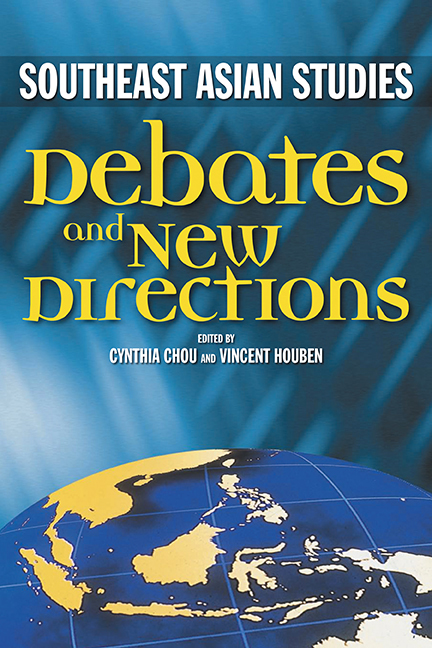Book contents
- Frontmatter
- Contents
- List of Contributors
- Preface
- 1 Introduction
- 2 Southeast Asia: Personal Reflections on a Region
- 3 Region, Academic Dynamics, and Promise of Comparitivism: Beyond Studying ‘Southeast Asia’?
- 4 Towards Multi-Laterality in Southeast Asian Studies: Perspectives from Japan
- 5 The Academic's New Clothes: The Cult of Theory versus the Cultivation of Language in Southeast Asian Studies
- 6 Rethinking Southeast Asian Politics
- 7 Reconceptualizing Southeast Asian Studies
- 8 Southeast Asian History: The Search for New Perspectives
- 9 Film, Literature, and Context in Southeast Asia: P. Ramlee, Malay Cinema, and History
- Bibliography
- Index
9 - Film, Literature, and Context in Southeast Asia: P. Ramlee, Malay Cinema, and History
Published online by Cambridge University Press: 21 October 2015
- Frontmatter
- Contents
- List of Contributors
- Preface
- 1 Introduction
- 2 Southeast Asia: Personal Reflections on a Region
- 3 Region, Academic Dynamics, and Promise of Comparitivism: Beyond Studying ‘Southeast Asia’?
- 4 Towards Multi-Laterality in Southeast Asian Studies: Perspectives from Japan
- 5 The Academic's New Clothes: The Cult of Theory versus the Cultivation of Language in Southeast Asian Studies
- 6 Rethinking Southeast Asian Politics
- 7 Reconceptualizing Southeast Asian Studies
- 8 Southeast Asian History: The Search for New Perspectives
- 9 Film, Literature, and Context in Southeast Asia: P. Ramlee, Malay Cinema, and History
- Bibliography
- Index
Summary
When reading various hand-wringing essays on the state of Southeast Asian studies, it is common for the authors to offer a survey of how the field of area studies has developed. These surveys often involve the role of post- World War II politics and the distribution of governmental funds to ensure a knowledge of the region in the face of the Cold War, in the case of the United States, or the complex process of decolonization in which the former colonial nation-state fitfully tries to understand its relationship with its former colonies, which is common in the often nation-specific Southeast Asian programmes in Europe. Thus, that Cornell University has had a complex relationship with governmental funding agencies due to the presence of scholars who question American policy in Southeast Asia, or that the study of Indonesia at Leiden University barely kept afloat in the 1950s and then witnessed uncomfortable moments in the Dutch-Indonesian relationship, such as the fiftieth anniversary of Indonesian Independence, come as no surprise. 1 At the core of most of these studies is an uncertainty over the role of Southeast Asian studies in academia. While some scholars argue that there are basic cultural and geographic unities that reflect a certain regional unity over time, others emphasize how the regional designation only became prevalent after World War II. 2 This has resulted in many scholars of the region being doubtful of any contribution they can make toward larger academia, with the end result being a series of navel-gazing volumes – this one included – in which the basis for Southeast Asian studies is questioned.
Beyond the field of university administration and the need for government departments to create boundaries to compartmentalize studies, the disciplines of anthropology and history are usually the most successful in defending Southeast Asia as a region. Cultural similarities ranging from the preference for fermented fish paste to the traditional ubiquity of the pole house are placed alongside the high rates of female autonomy – when compared with “East” and “South” Asia (once again regional groupings) – and held up as proof of a certain common Southeast Asian culture.
- Type
- Chapter
- Information
- Southeast Asian StudiesDebates and New Directions, pp. 162 - 180Publisher: ISEAS–Yusof Ishak InstitutePrint publication year: 2006



